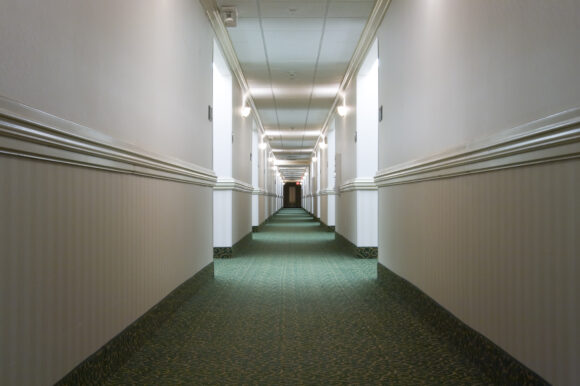An employee fired after she climbed into a colleague’s bed while sleepwalking at a hotel during an out-of-town conference has no disability discrimination claim, a three-judge panel of the 5th U.S. Circuit Court of Appeals ruled last month.
Jennifer Harkey, a sales specialist for NextGen Healthcare, attended an employer-run conference in St. Louis, Missouri in 2018. On the evening of October 10, Harkey had dinner and a few drinks with a female co-worker, then headed to her room and fell asleep.
Around midnight, another NextGen employee, Scott O’Donnell, heard a knock at his door. O’Donnell had just returned to his room from the hotel bar. Suspecting that the person at his door was one of the men who he had just seen at the bar, he opened the door without peering through the peephole.
Harkey, wearing only a black cotton robe, entered the room without looking at O’Donnell. O’Donnell, who did not recognize Harkey, told her to leave the room. She said nothing and walked over to a made bed, got in it, and pulled the sheets all the way up to her face.
O’Donnell called his supervisor to the room, who also did not recognize Harkey as a NextGen employee. The supervisor contacted the director of Human Relations for NextGen, Jill Burke, who was also attending the conference. Burke eventually woke up Harkey.
Harkey was disoriented when waking up and was very apologetic and embarrassed. Burke described her as smelling of alcohol and exposing skin. O’Donnell’s supervisor testified that he did not smell alcohol and that her robe fully covered her, so that no personal parts were exposed.
The next morning, Harkey went downstairs for breakfast and business. Sometime that morning, she was asked to go to a conference room where she met with Burke. Harkey was told she was “in very big trouble” and “needed to be concerned.” Harkey told Burke she had sleepwalked throughout her childhood but that it rarely happens.
Burke told Harkey to pack her bags and that she was suspended on paid leave. Burke also told Harkey to get in touch with a doctor.
On October 16, Harkey sent Burke an e-mail that she had been able to get an appointment with a diagnostician for the following week. Later that same day she sent that e-mail, Harkey was fired.
Harkey’s doctor diagnosed her condition as somnambulism, known as “sleep walking disorder.”
In September 2019, Harkey sued NextGen in state court under the Americans with Disabilities Act and the Texas Commission on Human Rights Act. The lawsuit was removed to federal court, where the district court granted summary judgment for NextGen. The district court concluded that Harkey failed to “show evidence that she was subject to an adverse employment decision because of her sleepwalking.”
The district court also held that NextGen fired Harkey for “misconduct,” and that Harkey could not demonstrate that this was pretext.
The 5th Circuit affirmed the district court’s decision on July 15 in an unpublished decision, concluding that Harkey has not shown she was fired because she had a sleepwalking disorder, she was fired because of what she did when she was sleepwalking.
The panel drew a comparison to two cases involving workers who were fired for violating company policy despite their behavior being caused by post-traumatic stress disorder and bipolar disorder.
“The ADA does not give employees license to act with impunity,” the panel wrote.
Was this article valuable?
Here are more articles you may enjoy.


 Explosive Wildfires Surge Through Oklahoma Panhandle and Kansas
Explosive Wildfires Surge Through Oklahoma Panhandle and Kansas  Bayer to Make $10.5 Billion Push to Settle Roundup Cases
Bayer to Make $10.5 Billion Push to Settle Roundup Cases  Gas-Guzzler Revival Risks Dead-End Future for US Automakers
Gas-Guzzler Revival Risks Dead-End Future for US Automakers  UK Floods Raise Specter of ‘Mortgage Prisoners’ Across Banks
UK Floods Raise Specter of ‘Mortgage Prisoners’ Across Banks 